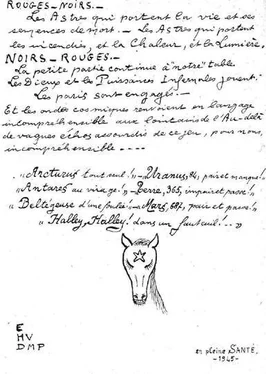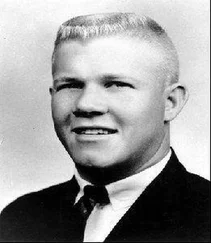The commissaire showed Georgette Petiot to her seat in his office and asked her if she would like a drink, which she refused. Then, as customary, Massu stalled a few minutes before launching into his questions. He tidied the papers on his desk, walked to the window, and gazed out onto the Pont Neuf. He saw cyclists crossing the bridge, some of the two million bicycles in Paris, the new ones then selling for almost as much as an automobile had only five years before. Massu wondered if Marcel Petiot had also biked across the bridge, towing who knows what in his cart.
Massu turned back to face the suspect’s wife. “Well, Madame Petiot, what do you know? No need to rush, we have a lot of time. Begin where you would like.”
“I must say that I was unaware of his business,” Georgette Petiot said, referring to her husband. She sat with her elbows on his desk, staring aimlessly ahead. In her right hand was a small handkerchief. Speaking in a low, barely audible voice, Petiot explained that she knew that her husband had purchased a property at 21 rue Le Sueur two or three years before (it was three years). Massu, settling into a chair near her, noted the beads of sweat on her forehead. He asked if she was warm and wanted to take off her coat. She did, revealing a tight red-and-white checkered sweater.
She had only been to rue Le Sueur one time, about two years before, Georgette Petiot said, but she had not gone inside. She had never liked the house. It was too large and expensive, costing nearly half a million francs. Moreover, it would mean that her husband would be home even less. Still, despite her misgivings, she had not protested at the purchase of the property because, as she put it, her husband attracted a large clientele at his medical practice and made a lot of money.
As for the renovations to the property, Georgette knew that Dr. Petiot was skilled enough to perform much of the interior work himself, such as the painting, the installations, and the decorations. She then bragged about his talent at sculpture, particularly working in wood, but did not provide any specific information about possible renovations to rue Le Sueur.
Massu asked about her husband’s bicycle and trailer. Georgette Petiot claimed not to remember exactly when he bought them, though she believed that they had been acquired together. She knew that he used them when he went to the auction houses, where he often indulged his hobby of purchasing “old books and antiquities.” Above all, in response to Massu’s probing, Georgette defended her husband as a “very gentle man” who took care of his family. His patients adored him. And if they were poor, or unable to pay his medical fees, she added, Petiot would not take a sou.
There was a problem about eight years ago, Georgette acknowledged. Her husband had ended up in a mental institution because, she told Massu, of “some troubles he experienced following the accidental death of one of his clients.” Georgette was referring to the thirty-year-old woman Raymonde Hanss, who had lost consciousness after Dr. Petiot treated an abscess in one of her teeth. Hanss’s mother blamed the physician for her death, but an investigation was never made with any thoroughness.
WHEN Massu asked about the events of March 11, 1944, Georgette said that her husband had spent the morning making house calls. They had eaten lunch together at the apartment and then, about three or three thirty, he left again “without telling me where he was going.” Marcel refused to keep her updated on his activities, she said, and this was her one reproach with their marriage.
About six that evening, Petiot returned home and received a client who had been waiting for a consultation. One hour and a half later, about seven thirty p.m., as she and her husband dined together, they were interrupted by the telephone call from the police, informing them of the chimney fire. As Massu called for specifics about her and her husband’s response immediately afterward, he observed that his questions disturbed Georgette. She sank into the chair and, raising her hand to her eyes, began to cry. Massu later said that he thought she would crack at any moment.
“Pull yourself together. We do not want anything from you. We only want to know the truth. What did your husband say?”
“I heard the word ‘police.’ Marcel immediately grabbed his hat and left.”
“Did he not say where he was going?”
“No, he didn’t give me an explanation.”
“Did he often leave without saying where he was going?”
“Sometimes. I never questioned him.”
Georgette would only admit to following him down the stairs to see which direction he went, later adding that she had accompanied him around the corner onto rue Saint-Lazare. She never said anything about their conversation along the way.
When Massu asked her what she did after her husband’s departure, Georgette Petiot said that she had “waited all night in an armchair.” Did she always do that whenever Dr. Petiot left without giving any information on his destination? No, that night was different. “It was the word ‘police’ that disturbed me.”
“But this word should not have disturbed you since you know your husband is incapable, as you say, of doing an evil deed. Was there something else that bothered you?”
“You never know, these days, what is going to happen to a man who has business with the police.”
Georgette Petiot was right. The Nazi Occupation had vastly complicated criminal investigations, tarnishing respect for law and the police who enforced it. Massu later said that he admired her for her candid remark, which was uttered at no small risk to herself. He pressed on, however, with questions about her actions immediately following the discovered remains at the town house.
“That morning, did you think of going to rue Le Sueur to find your husband?”
“No, I decided to return to Auxerre,” she said, eager to be with her son, who then studied in that town and lived with her husband’s brother Maurice. She went to Gare de Lyon, looking for the seven or eight o’clock train, but learned that there were none leaving until Monday evening. “I returned to the neighborhood of rue Caumartin, but without returning to my apartment.”
“Why?”
“I do not know.… A feeling told me that there was danger there for us.”
“Was it not rather the sight of two policemen at the door that made you turn back?”
“I do not know. Yes perhaps.” She also said that she had hoped, despite everything, to find her husband somewhere on the street.
Georgette Petiot explained that she went to church, attending several masses, and then spent the rest of the afternoon at the busy train station Gare Saint-Lazare. She was not waiting for anyone, she told the commissaire, and she had not gone there to avoid being recognized. “I was afraid, and I felt more security in the middle of the crowd.”
Asked what exactly she feared, Petiot said that the evening newspapers had appeared at the train station kiosk about six o’clock, and she had panicked when she saw her name on the front page of Paris-Soir . That night, she went to one of her husband’s properties, at 52 rue de Reuilly, thinking that he might come there and give her an explanation. He did not. And as she did not know anyone there, she hid on a staircase near the attic, fleeing into the shadows when a door opened, or occasionally into the courtyard of the neighboring building, which her husband also owned. Fearing detection, she had not slept well.
Early Monday morning, she had gone back to the Gare de Lyon and found the train schedules. As the next departure was not until 5:20 p.m., she spent most of the day at a small hotel restaurant, the Hôtel Alicot at 207 rue de Bercy. She bought her ticket at the last minute and boarded the train for Auxerre. Arriving at 9:00 p.m., she went over to the apartment of her brother-in-law Maurice on rue du Pont. She hoped to find her husband, she repeated, but no one was home. She waited, terrified and uncertain of her next move.
Читать дальше












